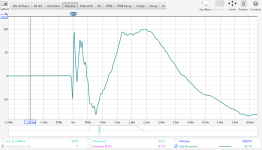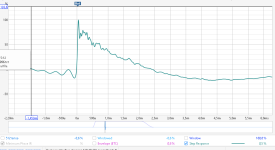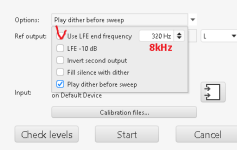Ok! So you have to use acoustic reference.
In case of crossover design, where you need to get FR curves for each speaker individually, how do you do?
In my case, I use analog DBX mic. I position it in front of the speaker and without any physical move, I take the 3 measurements.
Each measurement will come with the exact distance to the mic.
Example, suposing around 1m distance mic from speaker
Woofer: 1,00m
Mid: 1,06m
Tweeter: 1,08
Then REW knows each distance and put them in the FR files.
Then I upload the FR files with this timing mark to XSIM for crossover simulation.
This way we know the phases will be in sync for simulation - this is a must.
In case of crossover design, where you need to get FR curves for each speaker individually, how do you do?
In my case, I use analog DBX mic. I position it in front of the speaker and without any physical move, I take the 3 measurements.
Each measurement will come with the exact distance to the mic.
Example, suposing around 1m distance mic from speaker
Woofer: 1,00m
Mid: 1,06m
Tweeter: 1,08
Then REW knows each distance and put them in the FR files.
Then I upload the FR files with this timing mark to XSIM for crossover simulation.
This way we know the phases will be in sync for simulation - this is a must.
I don’t know, I don’t go below 40 Hz and above 110 dB either.Is there any problem with bass frequencies as some other mics have?
I use digital band division and there are slightly different criteria, I have not come across books on creating speakers with digital crossovers. And I am not interested in passive band division, so I have not come across such books either.And one more thing. Is there any tutorial how to design a crossover with this equipment?
But this does not mean that they do not exist. They most likely exist, I just do not know about them.
Here on the forum there are good threads on creating three-way speakers using CAD and microphone measurements. So just read the thematic threads on this forum for starters...
I have a different approach to mixing speakers, so I can't give a precise answer to your questions. I don't use CAD to calculate the resulting crossover frequency response. I think my speaker mixing technique in this thread will be a flood. I'll just say that I use phase-linear digital band-splitting, which allows me to align the acoustic centers of the emitters based on the step response that I get by measuring all three speakers simultaneously.In case of crossover design, where you need to get FR curves for each speaker individually, how do you do?


I think if we specify a frequency of 8 kHz in this window, we will get measurements of each band with a reference time relative to the tweeter. But I'm not sure, I've never done this because I don't need it.Example, suposing around 1m distance mic from speaker
Woofer: 1,00m
Mid: 1,06m
Tweeter: 1,08

Ok! Your approach is different, you do all them at once.
For @daimler, you need to decide which way you plan to follow before acquiring equipment, so you buy what you need.
As suggested, take a look on the 3-way section, there is a lot of discussion about buiding passive crossovers if this is your plan.
I have a good background in electronics, but I didn't know about timed measurements until last year - I was a bit lost but people here gave me good advices.
You can see my post below:
For @daimler, you need to decide which way you plan to follow before acquiring equipment, so you buy what you need.
As suggested, take a look on the 3-way section, there is a lot of discussion about buiding passive crossovers if this is your plan.
I have a good background in electronics, but I didn't know about timed measurements until last year - I was a bit lost but people here gave me good advices.
You can see my post below:
Good! Now ‘get to the gate.’ 😉
At the end of the day it is same old 3255I have found this interesting review of Fosi monoblocks with TPA3255.
What do you think about it?
review
For DIY build same thing as any amplifier. Use Good Heatsink Size.
If typical Switch Mode for power, Dont have to use weak little bare minimum supply current from manufacture.
For DIY can use something 2x or 3x larger since switch modes suck for actual real world continuous current they can supply.
So just use a healthy switch mode or a real transformer with regulated supply.